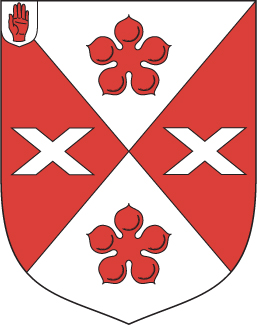Baronet
Baronet is a title of honor in the United Kingdom, granted by the British monarchy. Unlike peerage titles, a baronetcy is hereditary and entitles the holder to the prefix "Sir" followed by his first name, while his wife may use the title "Lady" followed by her husband's surname. The title of baronet was first introduced by King James I in 1611 as a means of raising funds. Unlike knighthoods, which do not pass on to the holder's descendants, a baronetcy is inherited, typically by the eldest son of the baronet.
History[edit | edit source]
The creation of baronetcies was initially aimed at addressing the financial needs of the crown. King James I established the title to raise funds for the settlement of the Province of Ulster in Ireland, and in return for a significant payment, a gentleman could be elevated to the rank of a baronet. This was seen as a way to solidify the social status of wealthy landowners and merchants without diluting the existing peerage.
Privileges and Responsibilities[edit | edit source]
Baronets have the privilege of adding the prefix "Sir" to their first names, while their wives can use "Lady" followed by the surname. They also have a specific coat of arms and are entitled to certain ceremonial roles. However, unlike peers, baronets are not entitled to sit in the House of Lords solely by virtue of their title. The responsibilities of a baronet traditionally included military duties, although this is now largely ceremonial.
Ranks and Precedence[edit | edit source]
In the hierarchy of British titles, baronetcies rank above all knight orders, but below barons. The order of precedence for a baronet is immediately below barons and above knights of the various orders. Within the baronetage itself, there is no formal order of precedence; however, in practice, those with older titles are often given informal precedence.
Types of Baronetcies[edit | edit source]
There are two types of baronetcies: of Scotland and of England, later extended to include Great Britain and the United Kingdom. The distinctions between these types are largely historical, reflecting the period in which they were created.
Current Status[edit | edit source]
As of the early 21st century, baronetcies are still granted, albeit infrequently. The title is considered a part of the British honours system, and new creations are typically made for individuals who have rendered exceptional service in various fields, including the arts, charity, and public service. The process of succession to a baronetcy is regulated by the Crown Office.
Notable Baronets[edit | edit source]
Over the centuries, numerous baronets have made significant contributions to British society and beyond. These include explorers, military leaders, scientists, and politicians. Some baronetcies have become extinct, while others continue to play an active role in contemporary society.
See Also[edit | edit source]
Search WikiMD
Ad.Tired of being Overweight? Try W8MD's NYC physician weight loss.
Semaglutide (Ozempic / Wegovy and Tirzepatide (Mounjaro / Zepbound) available. Call 718 946 5500.
Advertise on WikiMD
|
WikiMD's Wellness Encyclopedia |
| Let Food Be Thy Medicine Medicine Thy Food - Hippocrates |
Translate this page: - East Asian
中文,
日本,
한국어,
South Asian
हिन्दी,
தமிழ்,
తెలుగు,
Urdu,
ಕನ್ನಡ,
Southeast Asian
Indonesian,
Vietnamese,
Thai,
မြန်မာဘာသာ,
বাংলা
European
español,
Deutsch,
français,
Greek,
português do Brasil,
polski,
română,
русский,
Nederlands,
norsk,
svenska,
suomi,
Italian
Middle Eastern & African
عربى,
Turkish,
Persian,
Hebrew,
Afrikaans,
isiZulu,
Kiswahili,
Other
Bulgarian,
Hungarian,
Czech,
Swedish,
മലയാളം,
मराठी,
ਪੰਜਾਬੀ,
ગુજરાતી,
Portuguese,
Ukrainian
Medical Disclaimer: WikiMD is not a substitute for professional medical advice. The information on WikiMD is provided as an information resource only, may be incorrect, outdated or misleading, and is not to be used or relied on for any diagnostic or treatment purposes. Please consult your health care provider before making any healthcare decisions or for guidance about a specific medical condition. WikiMD expressly disclaims responsibility, and shall have no liability, for any damages, loss, injury, or liability whatsoever suffered as a result of your reliance on the information contained in this site. By visiting this site you agree to the foregoing terms and conditions, which may from time to time be changed or supplemented by WikiMD. If you do not agree to the foregoing terms and conditions, you should not enter or use this site. See full disclaimer.
Credits:Most images are courtesy of Wikimedia commons, and templates, categories Wikipedia, licensed under CC BY SA or similar.
Contributors: Prab R. Tumpati, MD





